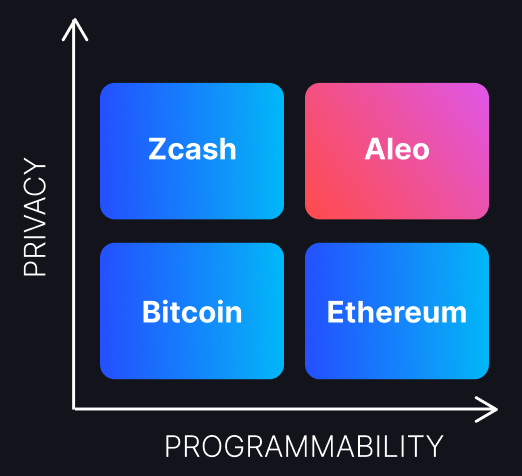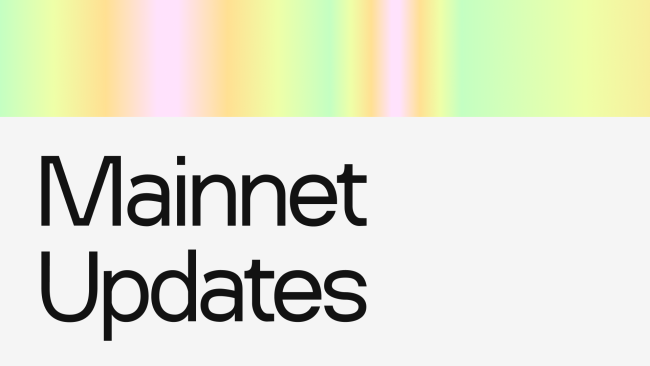Achieving a Critical Milestone with Deploy & Execute Launch

This week, Aleo reached an important milestone on the path to mainnet, and for the zero-knowledge industry, by releasing deploy and execute functionality. Aleo is now the first in Web3 to launch decentralized private computation.
Decentralized private computation (DPC) is a cryptographic primitive for smart contracts that use zero-knowledge proofs to prove transaction correctness without publicly revealing details about the user’s actions. It extends the prior models for privacy-preserving transactions (such as Zerocoin and Zerocash) to enable anyone to deploy and run any program, permissionlessly and privately. It combines the privacy-preserving nature of ZCash, with the flexible smart contract model of Ethereum. This primitive was first described in a research paper titled Zexe, published in 2018 by six co-authors, four of which are our team members (including our founder Howard Wu). Five years later, this critical functionality is live on Aleo.

With DPC and the release of deploy & execute, Aleo unlocks the power of zero-knowledge proofs on a decentralized architecture developers expect in Web3, all while ensuring that user privacy is preserved. Specifically, developers building on Aleo benefit from an unlimited runtime and complete data privacy, all within a permissionless proving environment. Let’s examine these three aspects further.
Unlimited Runtime
With a typical blockchain, developers are limited in terms of application runtime, which is usually enforced with the concept of "gas." With Aleo, developers can create applications unbounded by gas limits, enabling users to execute any program, no matter how long-running. This is because Aleo transactions are just zero-knowledge proofs that have uniform verification time, regardless of program running time, as the computations for running applications take place off-chain.
This unlocks many new applications that weren't possible in Web3 before, like machine learning. On blockchains that use gas (like Ethereum), even a tiny linear regression would exceed the gas limit. But with Aleo, transactions can cheaply prove the execution of large ML models that take minutes or hours to run. This unlocks new capabilities for Web3 applications, from verifiable credentials/self-sovereign identity to healthcare to quant trading.
Data Privacy
Blockchain applications today have only begun to scratch the surface of their potential. That’s because applications built on a traditional blockchain have to be public by default and by design. But Aleo ensures that users can retain control over what information gets shared and with whom. This model adds inherent security to any transaction and will create a range of new use cases.
Leo offers a range of tools to help users and developers ensure that they are complying with applicable laws and regulations while ensuring that consumer data is protected. Aleo supports view keys to allow users to selectively share the contents of a transaction with a chosen third party, as well as graph keys, which allow users to selectively share the set of parties they’ve interacted with. Crucially, this transparency can be finely tuned for the given application, ensuring a better user experience & better tools for compliance simultaneously.
Permissionless Proving
With deploy & execute, developers can now deploy programs to the Aleo program registry. We’ll get into the technical details in a future blog post. For now, it is sufficient to understand that the registry is a mapping of a programID to Aleo bytecode (the compilation target from Leo, our domain-specific language for ZK).
Because this registry is stored on a decentralized ledger, updates to the registry are censorship-resistant, thus mitigating platform risk for developers and users. Moreover, users can generate proofs of execution without relying on a third-party gatekeeper. Even if the authors of the Aleo toolchain or the developers of any deployed application go away, users can continue to run the programs that have been deployed on the decentralized network.
While many projects building zkEVMs aim at decentralization in the future, Aleo attains it today. Aleo is the only Web3 protocol where developers can write/deploy, and users can execute any zero-knowledge application without needing to email a BD team or use a prover API.
Looking Forward
Today marks a breakthrough in decentralized computing. Aleo has implemented, for the first time, the primitive of decentralized private computation described in the original Zexe research paper. With the advent of this technology, developers can now deploy applications to Aleo’s Testnet 3. Using the power of zero-knowledge proofs, users can execute those programs permissionlessly, off-chain, with a guarantee that their data is protected.
This is a major step as we move towards Aleo Mainnet launch. But it’s far from the only exciting feature that sets Aleo apart from other projects in Web3 using zero-knowledge cryptography. Over the coming weeks, we’ll have more to come!
If you’re a developer and want to get started: check out our developer docs for Leo here:
To deploy a program to our Testnet, refer to our special guide here.


